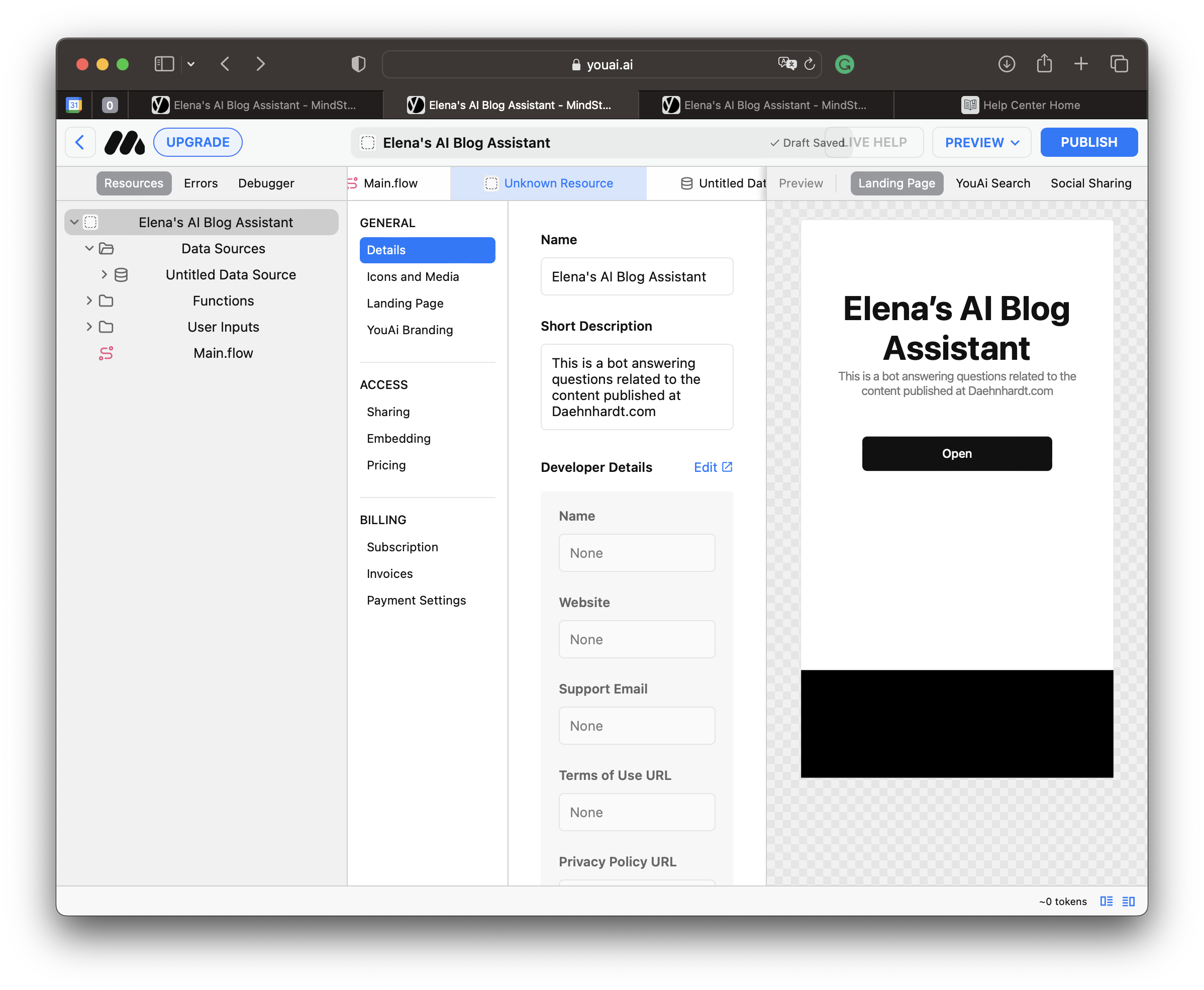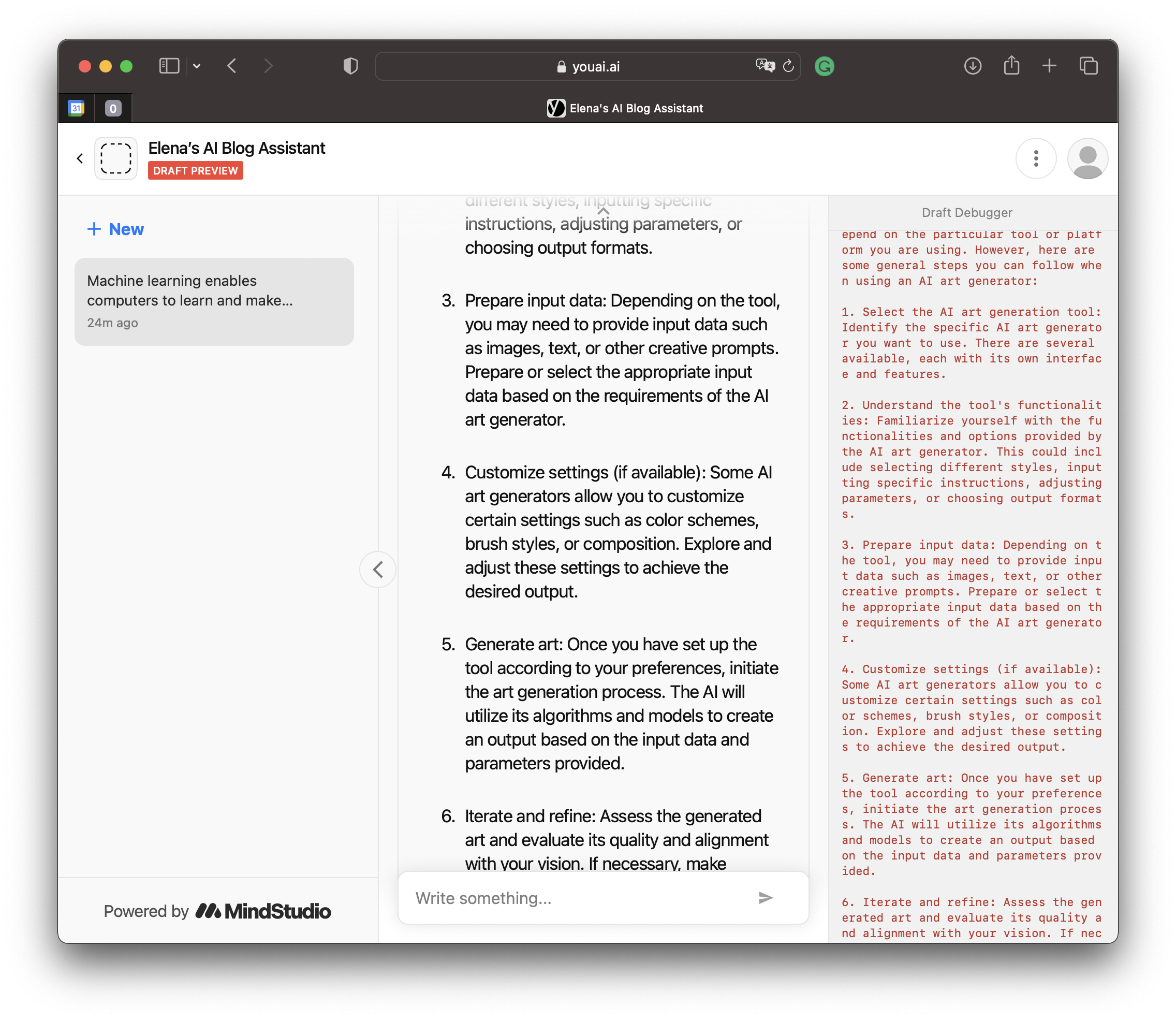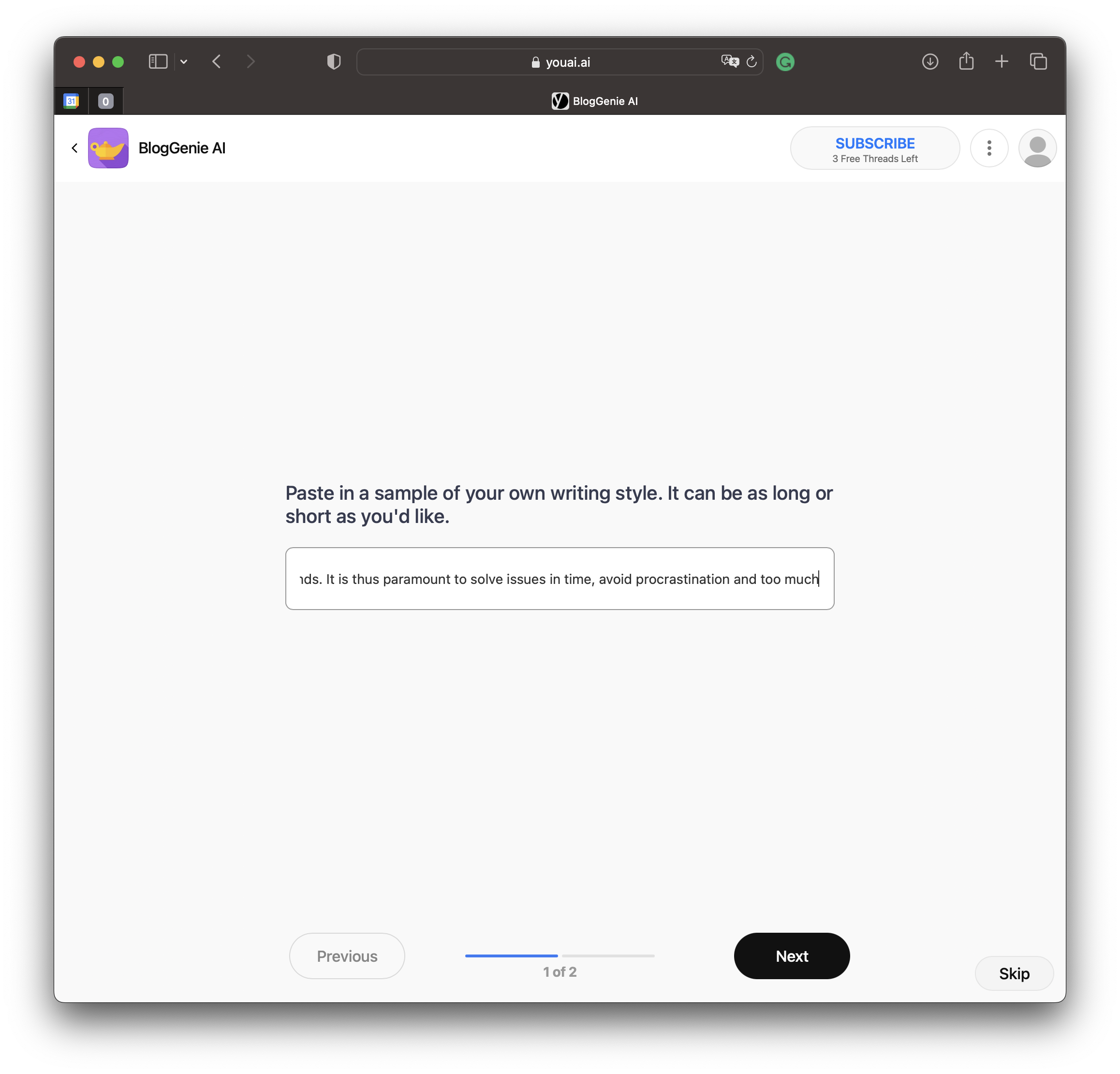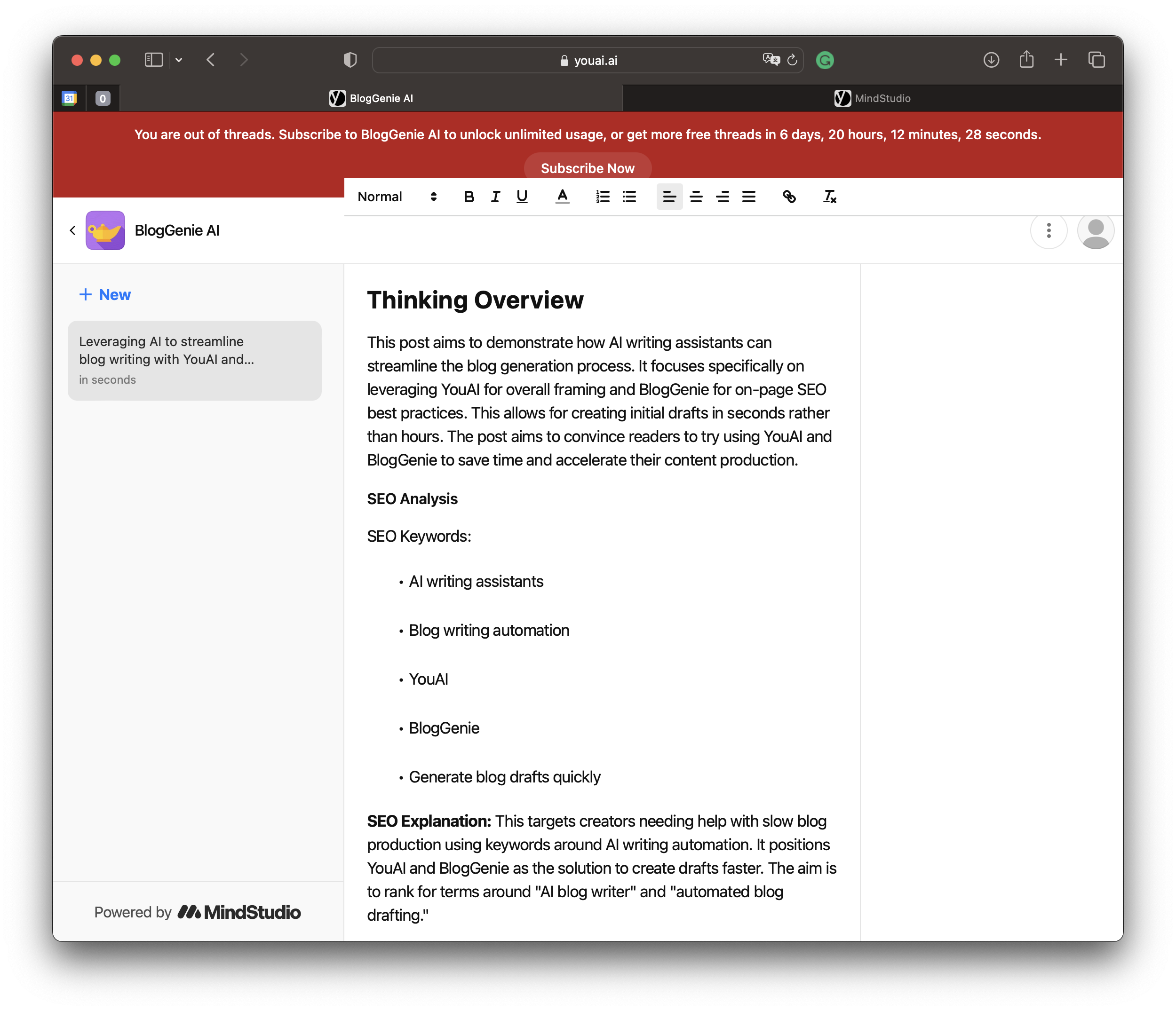Introduction
Content creation is essential for brands and writers today, but it can be highly time-consuming. AI writing assistants provide a solution, quickly drafting blog posts so you can focus on higher-value tasks. This post will explore how YouAI.ai and BlogGenie can help generate SEO-optimized blog drafts with just a few prompts.
Benefits of AI Writing Assistants
AI writing assistants like YouAI and BlogGenie offer several key benefits:
- Save Time:
- Instead of spending hours researching and writing original blogs from scratch, you can create a draft in seconds using AI. This frees up time for strategy, editing, graphics, and more impactful work.
- On-Demand Content:
- With AI assistants available 24/7, you can instantly generate blog ideas and drafts whenever inspiration strikes—no more waiting for team availability.
- SEO-Focused:
- Tools like BlogGenie allow the generation of posts tailored specifically around target keywords. This ensures content drives rankings from the start.
Drawbacks
AI writing assistants, while highly useful, also have some drawbacks. Here are some common disadvantages associated with AI writing assistants:
- Lack of Creativity and Originality:
- AI writing assistants generate content based on patterns learned from existing data. As a result, they may need more true creativity and produce content that is derivative or lacks originality.
- Contextual Understanding:
- AI models may struggle with understanding the context of a specific document or conversation. They may misinterpret the intended meaning, leading to inaccuracies or inappropriate suggestions.
- Bias in Language and Content:
- AI models can inadvertently perpetuate biases present in the training data. This can lead to biased language, favouring particular perspectives or demographics over others, which may not align with ethical standards.
- Overreliance on AI:
- Users may become overly dependent on AI writing assistants, potentially diminishing their own writing and critical thinking skills. Refrain from relying too heavily on AI to help personal growth and development as a writer.
- Security and Privacy Concerns:
- Uploading sensitive or proprietary information to AI writing platforms raises data security and privacy concerns. Users need to be cautious about the potential exposure of confidential information.
- Inaccurate Suggestions:
- AI writing assistants may provide grammatically correct suggestions but contextually inappropriate or factually inaccurate.
- Limited Domain Expertise:
- AI models are trained on diverse data but may need deeper expertise in specific domains.
- Difficulty with Ambiguity:
- AI models may need help handling ambiguous language or interpreting complex nuances. When human judgment and a deep understanding of context are crucial, AI writing assistants may need to catch up.
- Interface Challenges:
- Some users find interacting with AI writing assistants challenging, especially if the interface could be more user-friendly.
- Energy and Environmental Impact:
- Training and running large AI models can have a significant environmental impact due to the energy consumption associated with data centres.
I have tried several AI writing assistance programs and use them to write or improve my coding skills when doing quick drafts.
However, I often need to remove writing flourishing and too optimistic content that makes the posts too big and with less zest.
This is why we still have to correct the AI drafts so that we do not publish posts that are too long and less informative. Indeed, we can request concise content with a specific style and also detail certain parts. However, this requires an overall understanding of the context we write about.
Let’s try YouAI.ai’s solution for writing and implementing the AI assistant. Would it be useful for my blogging? Should I use it for my following posts?
Leveraging YouAI and BlogGenie
With YouAI.ai, you can request a blog on any topic and receive a professionally formatted draft post within seconds. The AI handles everything from headers to section content.
While YouAI.ai provides the raw structure, BlogGenie focuses specifically on SEO. Feed it a few target keywords, and it will return a markdown for an on-page optimised post.
Together, these tools remove the busywork of content creation. YouAI.ai delivers the framing, and BlogGenie incorporates SEO best practices from the start. This leaves you to refine and finalise rather than build from nothing.
A practical example
MindStudio at YouAI.ai provides so many AI tools that it is impossible to fit into one blog post. There are financial planners, email writing companions, SEO keyword planners, Cover Letter generators, etc.
I will focus on blog writing and build my AI using this blog content. Let’s see how it works.
MindStudio
YouAI.ai enables creation of AI for anyone to use. Creating your own AI with data from PDF files, websites, text, or other sources is possible. I will give it a try now.
First, you will need to provide some content to train the model. I have used a text file that includes content from my published blog posts.

Describe your bot and load it with data YouAI.ai
In a few minutes, I conversed with the bot and tested its work before publishing it online.

Conversing with the own AI created at YouAI.ai
This was useful for getting some information about my blog topics; the conversation with the AI was very similar to chatGPT.
However, I would like to see in detail how the output relates to my provided input file, and I would love to have some links pointing to my own content. It is important to remember when creating tailored assistants.
BlogGenie
You can use Blog Genie from the YouAI.ai website. The paid version costs $2 per month.
First, you must provide content that is yours so that BlogGenie can pick your writing style.

BlogGenie at YouAI.ai, feed it own text

The first draft produces SEO-optimised content and meta-data for keywords, BlogGenie at YouAI.ai
Overall, I liked the first draft. The content was similar to the chatGPT writing since they use similar models. However, the additional SEO optimisation is beneficial for online ranking.
I have corrected the AI content and provided my opinion on this product. You might disagree or share your thoughts with me. I would love to know about your ideas.
Conclusion
AI writing assistants enable the creation of blog drafts on demand so you can allocate more time towards strategy and high-impact work. Combined solutions like YouAI.ai and BlogGenie provide an easy way to tap into these benefits.
However, you still need to do loads of editing before publishing your posts. The positivistic and well-written content is excellent, but you need to remember about reality and provide actual and pertinent information, which is so much required by our readers.
Now, you can use AI content writing and also think by yourself, which exercises your brain :)
Did you like this post? Please let me know if you have any comments or suggestions.
Posts about AI Apps that might be interesting for you
